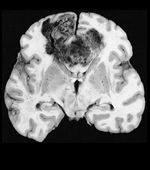Brain Tumor Vaccine Shows Promise
Results from a phase II clinical trial with HSPPC-96 (vitespen), an autologous heat shock protein-peptide vaccine, have shown promise in patients with recurrent glioblastoma multiforme.
Results from a phase II clinical trial with HSPPC-96 (vitespen), an autologous heat shock protein-peptide vaccine, have shown promise in patients with recurrent glioblastoma multiforme. The results were presented last week in Miami, Florida at the plenary session of the 80th Annual Scientific Meeting of the American Association of Neurological Surgeons.

Untreated glioblastoma multiforme with the classic "butterfly" configuration
Dr. Andrew Parsa, department of neurological surgery at the University of California in San Francisco (UCSF), presented the results of the trial. Over 40 patients treated with the vaccine lived significantly longer than 86 patients not enrolled in the vaccine trial and treated with alternative therapies during the same time frame. The vaccine was injected intradermally once a week for 4 weeks in a row after standard of care therapy with radiation and temozolomide.
The median overall survival was 47.6 weeks for vaccine-treated patients compared to 32.8 weeks for the nonvaccine glioblastoma multiforme group. Survival at 6 months was 93% compared to 68% for the vaccine-treated and nontreated groups, respectively (P < .01). No grade 3 or 4 side effects were reported among the patients taking the vaccine. The comparator group was controlled for age, extent of tumor surgical resection, and Karnofsky performance status (KPS).
HSPPC-96 is made from each individual’s tumor. The vaccine is designed to reprogram the patient’s immune system to better target the tumor cells while leaving healthy tissue unaffected. Side effects associated with traditional cancer treatment should be limited in patients administered with the vaccine.
Dr. Parsa attributes the successful execution of the trial to the sponsors-a National Cancer Institute grant, called Brain Tumor SPORE (Specialized Program of Research Excellence). The scope of the grant is to translate basic bench science research and new discoveries into better ways to treat and monitor brain tumor patients. The grant is currently in its 10th year. Patient advocacy groups-American Brain Tumor Association, Accelerate Brain Cancer Cure, and the National Brain Tumor Society-also helped fund the trial. UCSF does not have any financial interest in Agenus, Inc, the biotechnology company that makes the vaccine and Dr. Parsa did not receive financial support or consulting fees from the company.
Glioblastoma Multiforme
Glioblastoma multiforme is the most prevalent type of primary malignant brain tumor. It is associated with a poor prognosis-the 5-year survival rate is approximately 4.5%. Overall, more than 22,000 malignant brain and spinal cord tumors were diagnosed in 2010 according to the American Cancer Society. Glioblastoma multiforme tumors are diagnosed in 17,000 patients every year. No standard of care exists for patients with recurrent glioblastoma. Primary treatment is radiotherapy and temozolomide after surgical resection. The treatment prolongs survival but most patients progress within about 7 months.
Further Studies
Researchers involved in the trial believe that there is promise to combine the vaccine with other agents. A large-scale, 220 patient, randomized phase II trial is being planned to test HSPPC-96 vaccine in combination with bevacizumab in patients whose glioblastoma multiforme has recurred following surgery. Bevacizumab is a current treatment for glioblastoma multiforme. The NCI’s Alliance for Clinical Trials in Oncology cooperative group is sponsoring trial. Overall survival will be the primary endpoint in the three-arm study comparing the vaccine with bevacizumab given together or only at progression to bevacizumab alone. A phase II trial of the vaccine in combination with temozolomide in newly diagnosed glioblastoma multiforme is currently ongoing.
Reference
1. Parsa AT, Crane C, Han S, et al. A Phase 2 Multicenter Trial of Autologous Heat Shock Protein-Peptide Vaccine (HSPPC-96; vitespen) for Recurrent Glioblastoma Multiforme Patients Shows Improved Survival Compared to a Contemporary Cohort Controlled for Age, KPS and Extent of Resection. Annual Scientific Meeting of the American Association of Neurological Surgeons. Abstract 704, 2012.